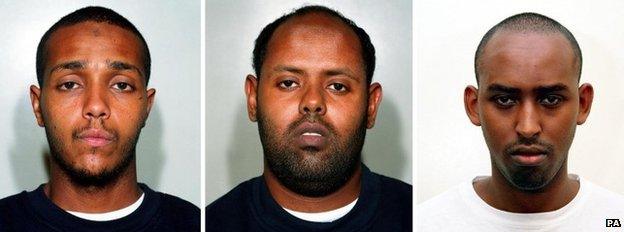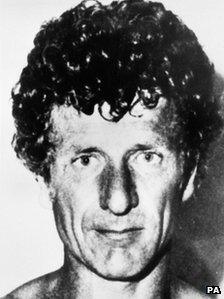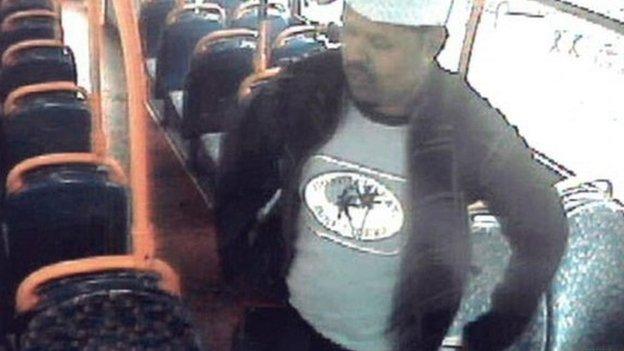Case of 2005 bomb plot to be examined by European judges
- Published

Ramzi Mohammed (L), Muktar Said Ibrahim and Yassin Omar were found guilty of conspiracy to murder
Senior judges at the European Court of Human Rights are to examine the case of three men jailed over the 21/7 plot to bomb the London transport network.
Judges in the court's Grand Chamber said they would hear arguments that the failed bombers had an unfair trial.
The men, each jailed for life for the botched 21 July 2005 attacks, say their convictions are unfair because police interviewed them without a lawyer.
Judges will also re-examine England's law on life sentences without parole.
In the separate case, Arthur Hutchison, who was convicted of burglary, rape and three counts of murder, is challenging a decision to jail him for life without the possibility of parole.
'Safety interviews'
The failed bombers had targeted three London Underground trains and a bus - in an attempted repeat of the 7/7 attacks of two weeks earlier - but their devices failed to explode.
Because the bombs did not explode, police were able to recover forensic material from the scenes, while CCTV images of the bombers were also available.
Ramzi Mohammed, Muktar Said Ibrahim and Yassin Omar were each found guilty of conspiracy to murder and sentenced to minimum terms of 40 years' imprisonment.

Muktar Said Ibrahim was captured on CCTV on a bus
However, the three failed bombers say their human rights were breached because statements they made to police without lawyers present were used as evidence.
Police have the power to carry out so-called "safety interviews" of terrorism suspects where there is an urgent need to establish if there is any danger to the public, such as from an unexploded bomb.
The bombers were later convicted following a trial, which included their own admissions that they built the bombs.
In a statement, the European Court of Human Rights said that the Grand Chamber would consider whether the men's initial interviews led to a breach of a right to a fair trial - even though a lower chamber of the court had already dismissed such a claim.

Analysis

By Dominic Casciani, BBC home affairs correspondent
The decisions by the Grand Chamber to review these two very controversial cases gets to the heart of the tension between London and Strasbourg - a relationship that is as political as it is legal and constitutional.
Ministers and judges have been at loggerheads for years over the lawfulness of whole-life orders in England.
So if Strasbourg rules in Hutchinson's favour, it will inevitably embolden those who are lobbying the prime minister not only to create a British bill of rights, but also to withdraw from the European Convention at the same time.
The 21/7 case looked - on paper at least - to have no chance of a hearing, but the bombers will get another chance in court, although the process could take many months.
Even if the European Court does rule in their favour - and that is a very big if - it cannot quash their convictions.

Wedding night murders
Hartlepool-born Hutchinson was jailed for stabbing Basil and Avril Laitner to death after breaking into their Sheffield home on the night of their daughter's wedding in 1983. He also killed one of their sons.
The judge in his 1984 trial at Sheffield Crown Court said he should serve 18 years but Home Secretary Leon Brittan later ruled he should face a whole-life tariff.

Arthur Hutchinson was jailed in 1984 for killing three people
Hutchison argues that the "whole-life order" sentence amounts to inhuman or degrading treatment and breaches the European Convention on Human Rights.
His challenge was rejected by the Court of Appeal in London seven years ago.
The Grand Chamber's decision to review the case comes after three years of tension between the government and Strasbourg over whole-life orders.
In 2013, the European judges said in a separate but related case that the sentence breached human rights because prisoners could not seek a review, even after decades inside.
But earlier this year, they reversed that decision in Hutchinson's case, declaring that British judges had now clarified that prisoners could indeed ask to be released in exceptional circumstances.
A Ministry of Justice spokesman defended the sentences, saying people who commit "the most heinous crimes" should face the prospect of spending the rest of their lives behind bars.
- Published16 December 2014

- Published3 February 2015
